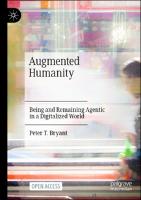Augmented Humanity
Being and Remaining Agentic in a Digitalized World
| dc.contributor.author | Bryant, Peter T. | |
| dc.date.accessioned | 2021-08-13T14:38:36Z | |
| dc.date.available | 2021-08-13T14:38:36Z | |
| dc.date.issued | 2021 | |
| dc.identifier | ONIX_20210813_9783030764456_12 | |
| dc.identifier | OCN: 1264082405 | |
| dc.identifier.uri | https://library.oapen.org/handle/20.500.12657/50418 | |
| dc.description.abstract | This open access book will examine the implications of digitalization for the understanding of humanity, conceived as a community of intelligent agency. It addresses important topics across a range of social and behavioral theories and identifies a range of novel mechanisms and their social behavioral effects. Across the book, the author highlights the expansion of intelligent processing capability brought about by digitalization and the challenges this exposes for integrating artificial and human capabilities. It includes the altered effects of bounded rationality in problem solving and decision making; related changes in the perception of rationality, plus novel myopias and biases. It also seeks to address cognitive intersubjectivity, learning from performance and agentic self-generation; and the novel methods and patterns of reasoned thought which emerge in a digitalized world; and how these mechanisms will combine in making and remaking the world of human experience and understanding. This book examines the problematics and prospects for digitally augmented humanity. In doing so, it maps the terrain for a future science of augmented agency. It will have cross-disciplinary appeal to students and scholars of applied psychology, cognitive and behavioral science, organizational psychology and management, business, finance, and digital cultures and humanities. | |
| dc.language | English | |
| dc.subject.classification | thema EDItEUR::J Society and Social Sciences::JM Psychology::JMS Psychology: the self, ego, identity, personality | en_US |
| dc.subject.classification | thema EDItEUR::J Society and Social Sciences::JM Psychology::JMR Cognition and cognitive psychology | en_US |
| dc.subject.classification | thema EDItEUR::J Society and Social Sciences | en_US |
| dc.subject.classification | thema EDItEUR::J Society and Social Sciences::JM Psychology::JMJ Occupational and industrial psychology | en_US |
| dc.subject.classification | thema EDItEUR::D Biography, Literature and Literary studies::D Biography, Literature and Literary studies::DS Literature: history and criticism | en_US |
| dc.subject.classification | thema EDItEUR::Q Philosophy and Religion::QD Philosophy | en_US |
| dc.subject.other | behavioral science | |
| dc.subject.other | applied psychology | |
| dc.subject.other | social cognitive psychology | |
| dc.subject.other | organizational design and management | |
| dc.subject.other | microeconomics and preferential choice | |
| dc.subject.other | artificial intelligence | |
| dc.subject.other | cognitive bias | |
| dc.subject.other | rationality | |
| dc.subject.other | digitization | |
| dc.subject.other | bounded rationality | |
| dc.subject.other | agency | |
| dc.subject.other | problem solving | |
| dc.subject.other | trust | |
| dc.subject.other | collaboration | |
| dc.subject.other | metacognition | |
| dc.subject.other | freedom of thought | |
| dc.subject.other | cognitive empathy | |
| dc.subject.other | cognitive plasticity | |
| dc.title | Augmented Humanity | |
| dc.title.alternative | Being and Remaining Agentic in a Digitalized World | |
| dc.type | book | |
| oapen.identifier.doi | 10.1007/978-3-030-76445-6 | |
| oapen.relation.isPublishedBy | 6c6992af-b843-4f46-859c-f6e9998e40d5 | |
| oapen.relation.isFundedBy | 892535b2-b503-4946-8ca7-36400694401c | |
| oapen.relation.isbn | 9783030764456 | |
| oapen.imprint | Palgrave Macmillan | |
| oapen.pages | 308 | |
| oapen.grant.number | [grantnumber unknown] |

